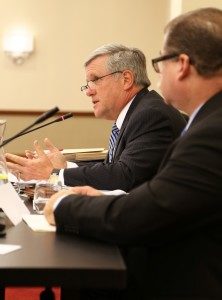Wildlife Trafficking Policy Lab Practicum Recommendations Adopted By President’s Advisory Council
STANFORD, Calif., June 9, 2014—Several recommendations by students involved in Stanford Law School’s Wildlife Trafficking Policy Lab practicum were adopted today by The President’s Advisory Council on Wildlife Trafficking.
In its third public meeting, the council identified and adopted 19 specific steps that it challenged the President’s cabinet-level Task Force to Combat Wildlife Trafficking to take to stop the international wildlife trafficking scourge— the rising tide of elephant, rhino and other wildlife killings that are feeding a burgeoning illegal trade in ivory, rhino horn and other wildlife parts and products.
Several of these steps were based on research and recommendations submitted by Stanford policy lab students, led by David J. Hayes, Vice-Chair of the Advisory Council and a Distinguished Visiting Lecturer at Stanford Law School.
“I’m glad to have had the chance to work on such a fascinating project under Professor Hayes’ fantastic supervision,” said Trevor Kempner, JD ’15. “Policy labs are an incredible opportunity to learn valuable skills while helping on initiatives with real-world implications.I am thrilled that the advisory council took our work into consideration when making their recommendations, and hope that the Government takes swift and decisive action to combat this horrible problem.”

These action items include emphasizing the need to forge public-private partnerships to address all aspects of the crisis, including stopping the killing, intercepting illegally trafficked wildlife products, and reducing the demand for such products.
Hayes emphasized that the Advisory Council has taken a strong stance, backed up by Stanford’s recommendations, in favor of bringing together businesses to fight wildlife crime. “Just as retailers and others in the diamond supply chain took action to address the blood diamond crisis in the 1990s, businesses like eBay are taking steps to ensure that ivory and other wildlife products are not sold in the marketplace,” said Hayes. “The White House has a unique opportunity to bring together businesses, NGOs and government agencies to stop illegal wildlife trade and raise awareness of the devastation that illegal trafficking is causing to some of the earth’s most iconic wildlife.”
Armed gangs, organized by sophisticated criminal syndicates, slaughtered more than 30,000 elephants and 1,000 rhinos in Africa last year alone, fueling a billion-dollar illegal black market that is corrupting governments and funding terrorist organizations.
The specific recommendations approved by the Advisory Council in its June 9 public meeting are available here. The Stanford submittal is published on the U.S. Fish & Wildlife Service’s web site.
